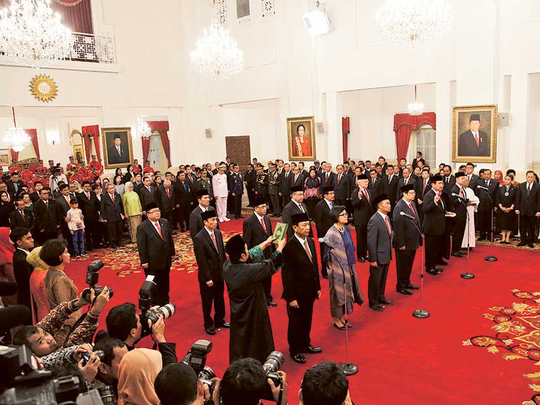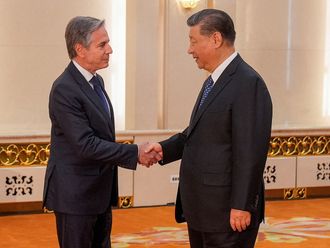
JAKARTA: Indonesian President Joko “Jokowi” Widodo announced a new Cabinet on Wednesday that puts a retired general linked to human rights abuses in charge of security and returns a popular reformist to the finance ministry.
Sri Mulyani Indrawati, who was finance minister from 2005 to 2010, is returning to the role from her current position as managing director at the World Bank, Jokowi said. In her first stint as finance minister, she was praised for overhauling a corrupt taxation department and guiding the economy through the 2008 global financial crisis.
The appointment is a coup for Jokowi and his efforts to reinvigorate the economy, but was overshadowed by a controversial military figure also joining the Cabinet.
President Joko Widodo (right) congratulates former general Wiranto after the inauguration ceremony. AP
The former military chief is accused of atrocities during Indonesia’s brutal occupation of East Timor, with activists calling it a step backwards for human rights.
Wiranto, named to the powerful post in a cabinet reshuffle, was among senior officers indicted by United Nations prosecutors over gross human rights abuses during the 24-year occupation of tiny East Timor.
Around 100,000 people are estimated to have been killed, mainly by Indonesian forces and their proxies, or to have died of starvation and illness during the occupation, which occurred during dictator Suharto’s three-decade rule.
Markets however cheered the appointment of prominent reformist Indrawati, currently a World Bank managing director, to the post of finance minister — six years after she resigned from the same job after coming under attack from conservative forces in the government.
Wiranto’s appointment was met with disappointment by rights activists. President Joko Widodo, who took power in 2014, was the country’s first leader from outside the political and military elites and it was hoped the influence of the old guard would wane under his leadership.
A total of 13 ministries were changed and nine of the ministers are new to the Cabinet. AFP
“It is a setback,” Andreas Harsono, Indonesia researcher for Human Rights Watch, told AFP. “The message might be that Jokowi (Widodo) is not going to be as progressive as before in pursuing his human rights agenda.”
Widodo was likely trying to balance his unwieldy ruling coalition, said Keith Loveard, a senior risk analyst at Jakarta-based Concord Consulting.
Wiranto replaced Luhut Binsar Pandjaitan, an ally of Jokowi who, though a former general, had opened a landmark symposium earlier this year into the 1965 atrocities that historians estimate killed half a million people. He had been ordered by Jokowi to investigate mass graves that survivors say are scattered throughout Indonesia.
Pandjaitan becomes the chief minister for maritime issues at a time when Southeast Asian nations are at odds with China over its territorial ambitions in the South China Sea.
It is the second reorganisation of Jokowi’s Cabinet since the maverick politician became president in 2014, after defeating an establishment candidate in a national election.
A total of 13 ministries were changed and nine of the ministers are new to the Cabinet. Many of the new appointments were in economy-related ministries, reflecting Jokowi’s focus on developing an economy that is one of the largest in Asia but suffers from weak infrastructure and entrenched poverty.
Wiranto’s Hanura party, a small partner in the coalition, lost two other ministers in the shake-up, which saw 13 changes to the cabinet and was the second reshuffle under Widodo.
Wiranto, who like many Indonesians goes by one name, was head of the armed forces when the Indonesian army and paramilitaries went on a bloody rampage in East Timor after it voted to become independent in August 1999. The country formally became independent in 2002.
He denies any wrongdoing and has never faced court over the atrocities.
He replaces Luhut Panjaitan in the key role of chief security minister, overseeing five ministries including foreign, interior and defence.
Observers suggest Panjaitan caused concern among the military elite and Islamic groups by taking unprecedented steps to probe a bloody 1960s purge of communists and their supporters.
Cabinet Secretary Pramono Anung defended the appointment of Wiranto, describing him as “tested and experienced”. He has previously held the posts of defence and security minister.
Despite the claims against him, Wiranto has managed to retain a prominent position in public life. He has been a presidential candidate in two elections and in 2009 was the running mate of Jusuf Kalla, the current vice-president.
It was Widodo’s latest controversial appointment to the top echelons of the security establishment. He also faced criticism for making hardline ex-general Ryamizard Ryacudu defence minister.
Panjaitan moved to the post of coordinating minister for maritime affairs, still a key job at a time when Indonesia is embroiled in rows with China over the South China Sea.
Indrawati previously held the finance minister post in 2005-10 and won praise for battling corruption and keeping Southeast Asia’s biggest economy on track. But she eventually resigned after facing attacks over a controversial bank bailout.
Tobias Basuki, a political analyst at the Centre for Strategic and International Studies in Jakarta, said the new Cabinet is a “very mixed bag” reflecting criss-crossing priorities that included giving ministries to political parties that have joined Jokowi’s coalition in parliament.
Some of the more progressive and younger politicians were taken out of the Cabinet, he said, but the reshuffle also removed poorer performing ministers.
“Jokowi is a pragmatic president and politician, so it’s not that he ignores human rights but at the same time it’s not a paramount principle for him, he has other pragmatic calculations,” said Basuki.











